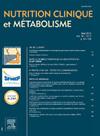Impact of social media use on food habits, sleeping duration and weight status of Algerian university students
IF 0.4
4区 医学
Q4 ENDOCRINOLOGY & METABOLISM
引用次数: 0
Abstract
Objectives
To assess food habits, sleep duration and weight status of university students. Also, to investigate the impact of social media use on students’ food habits, sleeping and weight status.
Materials and methods
A cross-sectional descriptive study was conducted among 400 Algerian university students, from February 2024 to May 2024. Data related to social media usage, eating habits, physical activity and sleeping was collected. Weight and height were measured and Body mass index was calculated and classified according to the recommendations. Statistics were performed using StatviewTM and SPSS software.
Results
The majority of students (59.0%) used social media for two hours and more per day. Overweight students were significantly (P < 0.0001) the most likely to use social media platforms. Students who used social media for more than four hours were the most likely to have irregular meals (P = 0.04), to skip breakfast, lunch, dinner (P < 0.05) and to snack between meals sugary and junk foods and drink sodas (P < 0.05). Students who used social media the most were those who sleep few hours (P = <0.0001).
Conclusion
The study elucidated a complex relationship between food habits, social media usage and weight status among university students. It highlighted prevalent irregular eating patterns and frequent meal skipping, compounded by the significant impact of social media on dietary behaviors.
社交媒体使用对阿尔及利亚大学生饮食习惯、睡眠时间和体重状况的影响
目的了解大学生的饮食习惯、睡眠时间和体重状况。同时,调查社交媒体使用对学生饮食习惯、睡眠和体重状况的影响。材料与方法在2024年2月至2024年5月期间对400名阿尔及利亚大学生进行了横断面描述性研究。收集了与社交媒体使用、饮食习惯、体育活动和睡眠有关的数据。测量体重和身高,计算身体质量指数,并根据建议进行分类。统计学采用StatviewTM和SPSS软件。结果大多数学生(59.0%)每天使用社交媒体的时间在2小时及以上。(P <;0.0001)最有可能使用社交媒体平台。使用社交媒体超过4小时的学生最可能饮食不规律(P = 0.04),不吃早餐、午餐和晚餐(P <;0.05),在两餐之间吃含糖和垃圾食品,喝苏打水(P <;0.05)。使用社交媒体最多的学生是那些睡眠时间很少的学生(P = <0.0001)。结论本研究揭示了大学生饮食习惯、社交媒体使用与体重状况之间的复杂关系。它强调了普遍存在的不规律饮食模式和频繁不吃饭,加上社交媒体对饮食行为的重大影响。
本文章由计算机程序翻译,如有差异,请以英文原文为准。
求助全文
约1分钟内获得全文
求助全文
来源期刊

Nutrition Clinique et Metabolisme
医学-内分泌学与代谢
CiteScore
0.80
自引率
16.70%
发文量
216
审稿时长
78 days
期刊介绍:
Nutrition Clinique et Métabolisme is the journal of the French-speaking Society of Enteral and Parenteral Nutrition. Associating clinicians, biologists, pharmacists, and fundamentalists, the articles presented in the journal concern man and animals, and deal with organs and cells. The goal is a better understanding of the effects of artificial nutrition and human metabolism. Original articles, general reviews, update articles, technical notes and communications are published, as well as editorials and case reports.
 求助内容:
求助内容: 应助结果提醒方式:
应助结果提醒方式:


